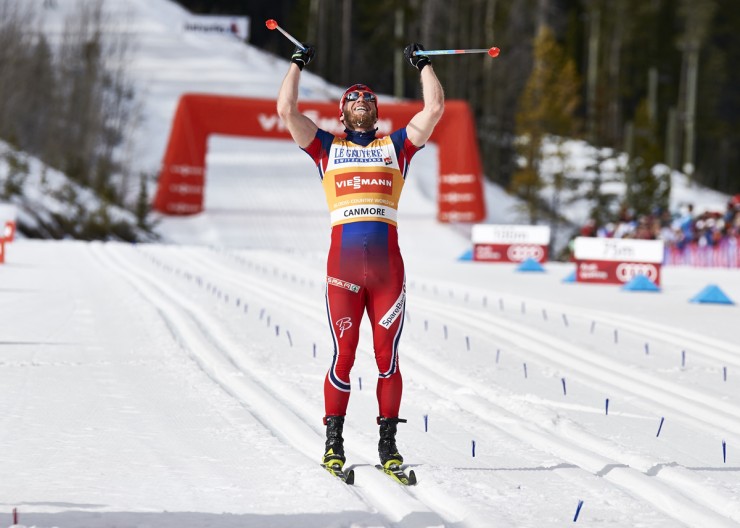
CANMORE, Alberta — Over night, Friday’s sun gave way to cloud-draped peaks, unpredictable winds and weather that seemed to change by the minute. When the men’s final Stage 8 of the Ski Tour Canada (STC) commenced on Saturday, a 15-kilometer classic pursuit, the tracks were warm, slow and barely holding form.
Although the weather was finicky, Stage 8 began with a simple premise. The Tour leader skied away first and those behind skied off depending on their overall time back. (For the sake of practicality, those ranked 11th-53rd started in a wave, 6:10 minutes back from leader, Russia’s Sergey Ustiugov, and their times were later adjusted at the finish.)
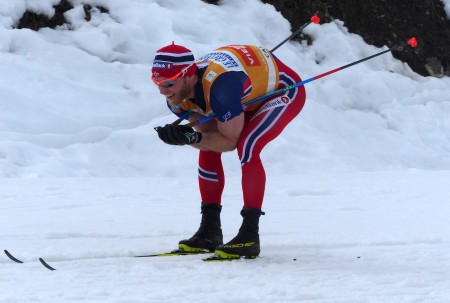
With one race left in the World Cup season, it was time for Norway’s Martin Johnsrud Sundby to go get the globes. He did that by winning the World Cup overall and the World Cup distance globe. The extra sparkle on those two iconic trophies, his win in Saturday’s pursuit gave him the Ski Tour Canada crown as well.
En route to winning the pursuit in 47:24.1, Sundby catapulted past Ustiugov, who began the day 32 seconds ahead of Norway’s Petter Northug and 39 seconds ahead of Sundby, who started third. Ustiugov ultimately finished second, 57.7 seconds behind Sundby, and Northug placed third (+1:52.5).
Maurice Manificat of France, who started the day seventh in the STC standings, jumped to fourth overall with the fastest time of the day in 45:54.6. The skier Manificat replaced in fourth, and who subsequently fell to fifth, was Canada’s best hope, Alex Harvey.
Harvey Spearheads a Maple-Leaf Charge
Harvey began the race 2:10 behind Ustiugov and wearing bib 4 as the STC’s fourth-ranked skier. With Sundby 1:31 ahead in third and Norway’s Finn Hågen Krogh starting 1:19 behind in fifth, Harvey double poled down the stadium corridor amidst Canadian flags waving and a boisterous home-country crowd urging him on.
Four laps of a deteriorating course — 15 k of hurt — is what Harvey had to endure. For the first two laps, the first half of the race, Harvey skied alone in fourth. But Manificat, starting at the back of a three-man pack, 19 seconds behind Krogh and 11 seconds behind Norway’s Emil Iversen in sixth, skied fresh — as if it weren’t the eighth day of pain.
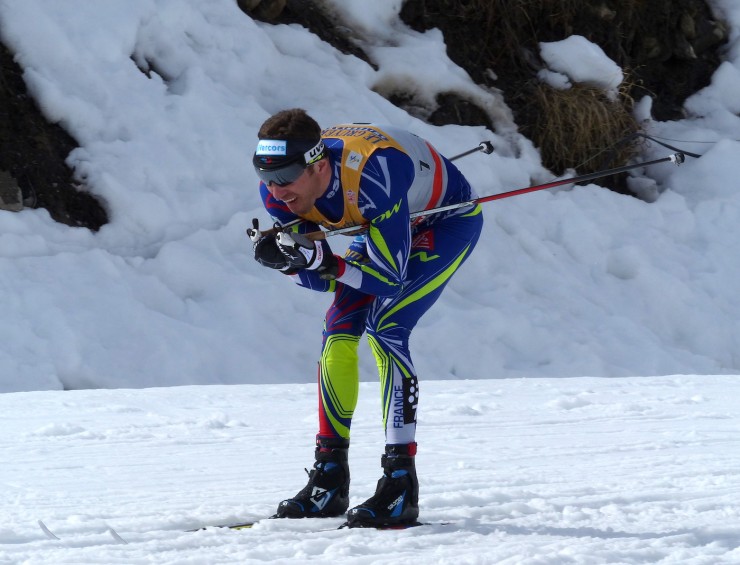
Stride by stride, the Frenchmen overcame a 1:38 starting deficit to Harvey to reel the Canadian in.
At 7.5 k Harvey remained 20 seconds ahead, but 2.2 k later, the duo were in a dead heat. They shadowed each other for another two kilometers, through the 11 k mark. Talk about tension. The crowd wanted a duel, but a duel with a favorable conclusion.
That hoped-for conclusion was rewritten by Manificat. At the finish, Harvey skied across the line 35.5 seconds behind Manificat for fifth-place overall.
“I was not skiing well,” Harvey said after the race. “I was not skiing well technically. I was just not on a good day. Bad body. Like the guys were starting so far behind me, I thought there was no way I would get caught, but I got caught.”
The 27-year-old Harvey did have a Canmore-career day on Friday during the 15 k skate. In the past, he explained that he struggled with Canmore’s altitude and steep climbs, and the soft snow conditions aren’t his preference. What he could subdue on Friday became a nemesis on Saturday. Add to that trifecta the last stage of an eight-stage tour and it’s a cocktail with the potential for a knock-out punch.
“You start feeling fatigued halfway through the tour,” Harvey said. “I didn’t feel that worse than yesterday, but just once the race started I was not on. I mean, I have a lot of bad days in my career. It’s just one of them. There’s nothing to worry about; you can’t be on top everyday.”
Pull the lens back, and instead of focusing on the moment’s result, things look brighter. Harvey was fifth overall in the inaugural Ski Tour Canada, 2:53.9 back from Tour winner Sundby.
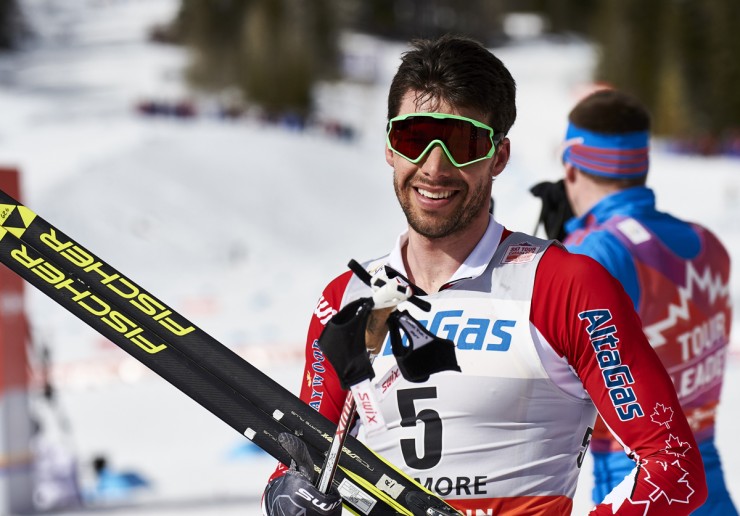
“It’s really good,” Harvey said of his fifth place. “Top five like that in a long stage tour, that’s the best result for me. By far the best, before it was 10th, so I cut that in half, so it was a great tour for me. I wanted to stay fourth. I thought a had a good shot at staying fourth, just because I had such a big gap on fifth.”
Canadian Head Coach Justin Wadsworth commented on a day when lots of shifting occurred in the Tour’s overall top 10.
“Anything can happen, and today it did,” Wadsworth said. “We saw a lot of things go on in the top 10 even. For sure we are disappointed to drop one spot with Alex, but overall, a top five is really good.”
Finland’s Matti Heikkinen, who podiumed twice at the STC, almost skied Harvey into sixth. But Harvey held him off, finishing 12.9 seconds ahead of Heikkinen, who posted the second-fastest time of day to race from ninth to sixth.
“He was able to hold off Heikinnen who was really charging,” Wadsworth said. “Heikkinen seems to be getting stronger and stronger. I think that was really good for [Alex] to fight it at the end and stay ahead. I think he should be satisfied, a top five is an amazing result, just really tough race out there today … Today was a real battle. It makes the best in the world look not that great.”
On the season overall, Wadsworth said it had its highs and lows.
“A bit up and down,” he said. “Kind of like the Tour, you know? It’s normally like that, I think it was a better finish. The Tour was pretty good in general for us, and it is a nice way to end the season. People scoring points that had never scored before and Ivan getting a lot of top 10’s. These guys, [Babikov and Kershaw], finishing 14th and 16th now overall. So we have three in the top 16 of the tour, which maybe is one of the stronger teams outside Norway [and] Russia … That’s something to keep in perspective. It’s pretty solid.”
Canadian National Team member Ivan Babikov mirrored Harvey’s STC consistency. On Saturday, Babikov was 14th through all three splits and ended up 14th overall (+7:30.3).
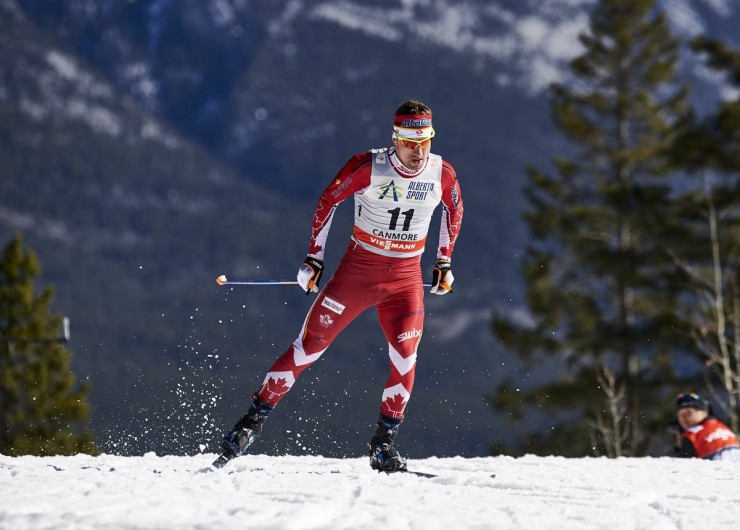
“Hard. Tough,” Babikov said of the stage. “But still it was good, so I was happy.”
After the first half of the Tour in eastern Canada, Babikov ranked 35th in the Tour. Back home in Canmore, Babikov knew he’d be finding his groove.
“I just needed to get to Canmore,” Babikov explained. “And luckily everything came together. My skis and body felt amazing and I stayed away from trouble, from crashes and everything. I would say this is my best Tour ever. Even when I finished top 10 in the Tour de Ski. But [in the Tour de Ski] there’s only one or two sprints, but here there’s three sprints. So right away I had a big disadvantage, but I mean coming back and two top 10’s and today’s a solid race, so I’m really happy.”
About finishing the Tour in his adopted home, the Russian-born Babikov said it couldn’t have been better.
“It’s magical. I mean, we don’t have this kind of competition that often and we’ve got to cherish them,” he said.
At 35 years old, Babikov can still ski the world’s toughest courses with the best.
“I still have fire in me. I still want to keep doing it,” he said. “If I can help my team in the relay race or the other races, World Championships coming up. I’m still alive.”
“I still have fire in me. I still want to keep doing it … I’m still alive.” — Canada’s Ivan Babikov on his future in racing after placing 14th overall in the Ski Tour Canada
Kershaw was another STC highlight for Canada. On his way to 16th overall (+8:17.1), Kershaw skied the 14th best time on the day, but remarked it wasn’t an easy effort.
“It was really hard,” Kershaw said. “The conditions were viciously bad so it made for a really hard 15 k.”
Also at home in Canmore, Kershaw, 33, was able to reflect and note that the STC was a personal success.
“It’s my best tour of the year. We’ve done three: one in Kuusamo, the Tour de Ski, and then this,” he said of the 2015/2016 World Cup schedule. “[Sixteenth] was good for the overall. I didn’t have any great races, but I had a lot of solid races, so it’s a good way to end the tour.”
Add Graeme Killick to the list of Canadians in the STC top 30. Killick had the 25th fastest time of day and placed 27th overall (+11:44.3).
“I was happy with it,” the 27-year-old Alberta native said. “I didn’t feel good in the start. I just tried to conserve as much I could and survive. I popped up the last hill, but didn’t lose as much time as I thought I would. It was tough but it’s good to be done.”
Killick mentioned that North American World Cups change the norms.
“It’s a big deal for us,” he said. “Just like the Americans, it’s tough going back and forth to Europe. If you have an opportunity like this that North America can take advantage of, it pays off for sure down the road. Just giving the young skiers a chance. That’s really what opened my eyes to what the level is on the international circuit.”
The International Scene
Throughout the week in Canmore, many of the European athletes expressed they loved the Ski Tour Canada, but qualified their admiration with comments about the tough travel and distance from home.
Perhaps the sport’s most affable ambassador is Sundby.
“It’s been for one thing; it’s been really cool, this tour has been really cool,” Sundby told FasterSkier. “But we had to travel so much we have been so different places and Canada is a huge country. So this is a difficult tour in that. And also, to have like eight races in such a short time at the end of the season it is challenging for the health of the skiers … because, like, half our team is quite sick and that is not good for the health. Even though the Tour is cool, the concept is cool, and the places are nice, so that’s the main thing.”
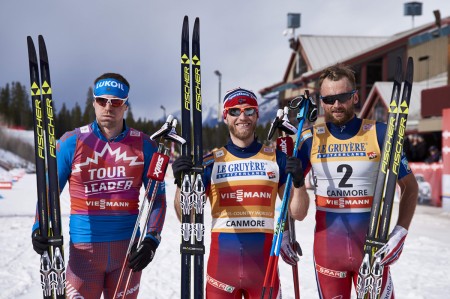
Growing a more global cross-country World Cup brand and bridging across the Atlantic is an idea Sundby endorses, but with some constraints.
“We can’t do this traveling every year, but we have to push it out, like one season or every other season, we need to come here,” he said. “We need to promote, we can’t be every fourth year because we need to sell the sport in this part of the world. I think we have found a good solution. After all, people think of this as a success. Like Tour de Ski, Ski Tour Canada will go out as a success.”
And so will Sundby’s season. With the overall and distance globes locked up before the final stage, Sundby had only the STC overall to take before his flight back to Oslo. But making up 39 seconds on an emergent Ustiugov, even Sundby had his doubts.
“After seeing the women’s race [where Johaug caught Weng for the win after starting 30 seconds back] I actually knew it was quite a big advantage to start behind,” Sundby said. “I knew that we were going to take seconds on Ustiugov, I didn’t know how many. I was a bit surprised we catch him early I reckon we had to go at least two or 2.5 laps before we were able to completely catch him.”
Northug and Sundby skied together, eventually catching the Russian. “I tried to go as soon as possible just to psyche him out,” Sundby said.
Saturday, Sundby awoke thinking he’d be doing work on Northug’s behalf.
“Actually this morning I didn’t think I had the chance. I felt like crap. I felt sick, and I told Petter this morning I was going to ski for him if we were be close to Ustiugov,” he recalled. “I had to give a big push just to get him up to Ustiugov and and then he could fight for the win because I didn’t feel good at all. But as soon as we started, it was a totally different story and my body felt good, skis were amazing, I felt this is definitely possible. I just went for it.”
When Sundby goes for it, few can keep pace. Northug quickly fell off and then it was Ustiugov’s turn to get distanced. Northug ultimately finished third, but his spin on the stage and the Tour was positive.
“It’s a been a great Tour and it’s been many good races for me in this Tour,” he said. “I am happy with Tour and the overall. I didn’t have the best skis today so it was difficult to follow Martin and Ustiugov in the easier part, so when I don’t have the best skis, it is impossible to win. I tried to fight hard for third place.”
On a final note, Northug was asked about his beard.
“I don’t know how long I will wear it,” Northug said. “Maybe it is gone today or tomorrow. We will see.”
Like Northug’s goal of standing atop the STC overall podium, the beard may be fleeting too.
The American scene
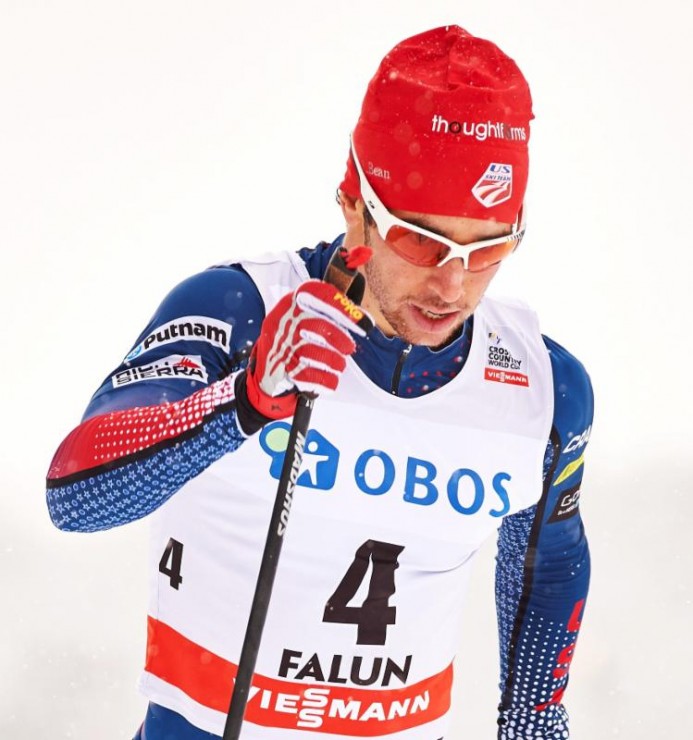
“I’m very encouraged with the way this tour ended,” U.S. Ski Team Women’s Coach Matt Whitcomb said.
For the U.S. men’s team, Noah Hoffman finished it out as the top American in 34th overall.
“Forty-seven minute 15 k, it was hard,” Hoffman said after the race. “I felt pretty good, like yesterday which is a step in the right direction. The season’s is over, time to rebuild, I am definitely looking for more. This tour and the year were good enough to keep me going, I want to go work way harder and get way better and come back and be competitive.”
Hoffman’s offseason starts with the upshot that he skied the 19th fastest time on the day. “I was pleasantly surprised to find myself in the top 20. I didn’t realize the wave was moving faster than many of the top-10 guys,” Hoffman wrote in an email afterward.
“Our guys skied a really strong race,” Whitcomb said. “They all started in the wave and all pushed the pace of the wave for a few laps. When the pace eventually turned up on lap three, unfortunately it was only Noah who was able to hang.”
Fellow U.S. Ski Team (USST) member Erik BjoBjornsen (APU/USST) was 42nd, Scott Patterson (APU) 46th, and Tad Elliott (SSCV) 51st.
For Canada, Michael Somppi (NDC Thunder Bay) was 49th, Canada’s Kevin Sandau (AWCA) was 43rd, and Russell Kennedy (Canmore Nordic) 50th.
Jason Albert
Jason lives in Bend, Ore., and can often be seen chasing his two boys around town. He’s a self-proclaimed audio geek. That all started back in the early 1990s when he convinced a naive public radio editor he should report a story from Alaska’s, Ruth Gorge. Now, Jason’s common companion is his field-recording gear.



